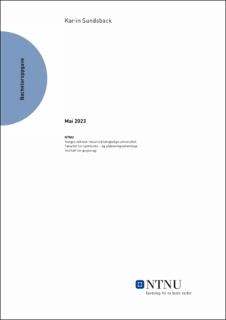| dc.contributor.advisor | Solem, Stian | |
| dc.contributor.author | Sundsback, Kariin | |
| dc.date.accessioned | 2023-07-04T17:19:46Z | |
| dc.date.available | 2023-07-04T17:19:46Z | |
| dc.date.issued | 2023 | |
| dc.identifier | no.ntnu:inspera:146342237:34532068 | |
| dc.identifier.uri | https://hdl.handle.net/11250/3075775 | |
| dc.description.abstract | I denne studien har registerdata fra de nasjonale statistikkbyråene i Norge og Nederland blitt analysert for å utforske hvordan foreldres utdanning og etniske bakgrunn, i tillegg til spesifikke kontekster i de nasjonale utdanningssystemene, kan påvirke barns fullføringsrater av videregående utdanning. Resultatene støtter hypotesene om at barn av foreldre med lav utdanning og innvandrerbakgrunn har større sannsynlighet for ikke å fullføre videregående utdanning sammenlignet med etnisk norske eller etnisk nederlandske barn av foreldre med høy utdanning. I tillegg virker det som at strukturen i nasjonale utdanningssystemer har en innvirkning, med en høyere fullføringsrate i videregående utdanning observert i Nederland enn i Norge. Dette kan være et resultat av større fleksibilitet i det nederlandske utdanningssystemet. Basert på kulturell reproduksjonsteori og kulturell kapital, antyder denne studien at foreldre med høy kulturell kapital kan videreføre fordeler til sine barn innen utdanningssystemet og dermed påvirke deres sjanser for å fullføre videregående utdanning. Studien fremhever viktigheten av ikke bare å ta hensyn til den sosiale og etniske bakgrunnen til familier når man forsker på sosiale ulikheter, men at nasjonale utdanningskontekster også bør tas i betraktning. | |
| dc.description.abstract | In this study registry data from the national bureaus of statistics in Norway and the Netherlands have been analyzed to explore how parent’s education and ethnic background, as well as the specific contexts of the national education systems, can impact children’s completion rates in secondary education. The results support the hypotheses that children of parents with low education and immigrant background are more likely not to complete secondary education compared to ethnic Norwegian or Dutch children of parents with higher education. Additionally, the structure of national education systems seem to have an influence, with a higher completion rate observed in the Netherlands compared to Norway. This might be a result of the greater flexibility in the Dutch education system. Based on cultural capital and cultural reproduction theory, this study suggests that parents with high cultural capital can transfer advantages to their children within the educational system and thereby impacting their chances of completing secondary education. The study highlights the importance of not only considering the social and ethnic background of families when researching social inequalities, but that national educational contexts also should be taken in account. | |
| dc.language | nob | |
| dc.publisher | NTNU | |
| dc.title | Veien til Skolesuksess.Fullføring av videregående utdanning i Norge og Nederland
En analyse av foreldres utdannings- og etniske bakgrunns påvirkning i nasjonal utdanningskontekst | |
| dc.type | Bachelor thesis | |
